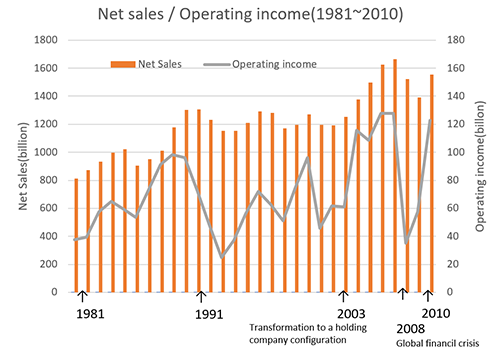100 Stories2011 Establishment of the Asahi Kasei Group Philosophy
“We, the Asahi Kasei Group, contribute to life and living for people around the world.”
That is our group mission, but how was it established?
In 2003, when the Asahi Kasei Group transitioned to a branch company/holding company structure, each business was to be built into a solid structure capable of competing in its industry, and autonomous management was promoted with an emphasis on cash flow. As a result, each business and the group as a whole minimized losses and achieved the goal of transforming itself into a sturdy business entity. However, while the initial goal moving toward a branch company structure was to break away from the low growth of the 1990s and to achieve growth as a group, the new organizational structure did not immediately produce satisfying results.
 (Japanese yen)
(Japanese yen)
In addition, the global financial crisis began around 2007, which started a dialogue about the limits of an economy dependent on finance. President Shiro Hiruta wished to restore the dynamism of the Group's new business development in the completely different world that lay in wait at the end of the financial crisis, so he raised the issue with management.
At the same time, he believed that it was necessary to return to the starting point and clarify the goal in order to establish a center for management decision-making that would not waver even in turbulent times, and to rebuild the sense of unity within the Group that had been diluted by the change to the branch company structure.
To this end, the Asahi Kasei Group held a series of discussions led by group executives where every executive was asked to fill out a questionnaire about the values and strengths they would like to leave behind for the next generation, thereby highlighting the center of the Asahi Kasei Group. At the May 2009 executive forum and the June 2009 regional executive meeting, executives agreed that the Asahi Kasei Group was facing a major turning point—one that occurs once every few decades. Discussions then turned toward Asahi Kasei's goals for the next 10 years, as well as growth opportunities and the strengths of the Asahi Kasei Group for realizing those opportunities. In August, each director in charge of a field of industry presented his or her thoughts on the strengths of the Asahi Kasei Group. In addition, an outside consultant conducted individual interviews with the executives and held numerous discussions at the group training camp.
Around January 2010, the directors agreed that no matter how the Asahi Kasei Group develops its business in the future, its raison d'être (mission) is to “contribute to life and living for people around the world.” Also, the common values to be passed on as DNA were integrity, creativity, and the will to take on a challenge.
In April 2010, Taketsugu Fujiwara, who assumed the position of president, fixed his awareness on the importance of keeping the founder's philosophy and frontier spirit alive in the present. In addition to the mission and values, the vision of coexistence with the environment and healthy and comfortable living were set as the direction of business activities to be aimed at in accordance with the demands of the times. Based on these principles, a mid-term business plan was formulated, and in April 2011, the Asahi Kasei Group Philosophy, Values, Vision, and Slogan were finalized and announced in May 2011.
Asahi Kasei had previously established management principles in 1996 and 2001, but they had not been well received by employees. However, the Group Philosophy established in 2011 has been widely adopted by employees around the world. Why is that? Yutaka Shibata, who served as the head of the Corporate Strategy Office during the enactment process, cites three reasons.
The first was learned through the large-scale merger and acquisition of companies overseas, starting with the acquisition of ZOLL in 2012. For Western companies, the existence of a corporate philosophy is a matter of course, and the explanation of the company begins with the corporate philosophy. Asahi Kasei's management team noted this, and it made the Group keenly aware once again of the importance of corporate philosophy in the development of a company on a global scale.
Second, the oneAK Committee, chaired by Fujiwara and with the Corporate Strategy Office, Human Resources Department, and Public Relations Department as its secretariats, was formed to develop global activities that would increase engagement and foster a sense of unity, not only at the management level but also among employees.
Third, Fujiwara continued to communicate his message.
Asahi Kasei will continue to manage its operations based on the Group's philosophy as the cornerstone of its management, and will always strive to realize it. This is the way Asahi Kasei has always been since its founding.

